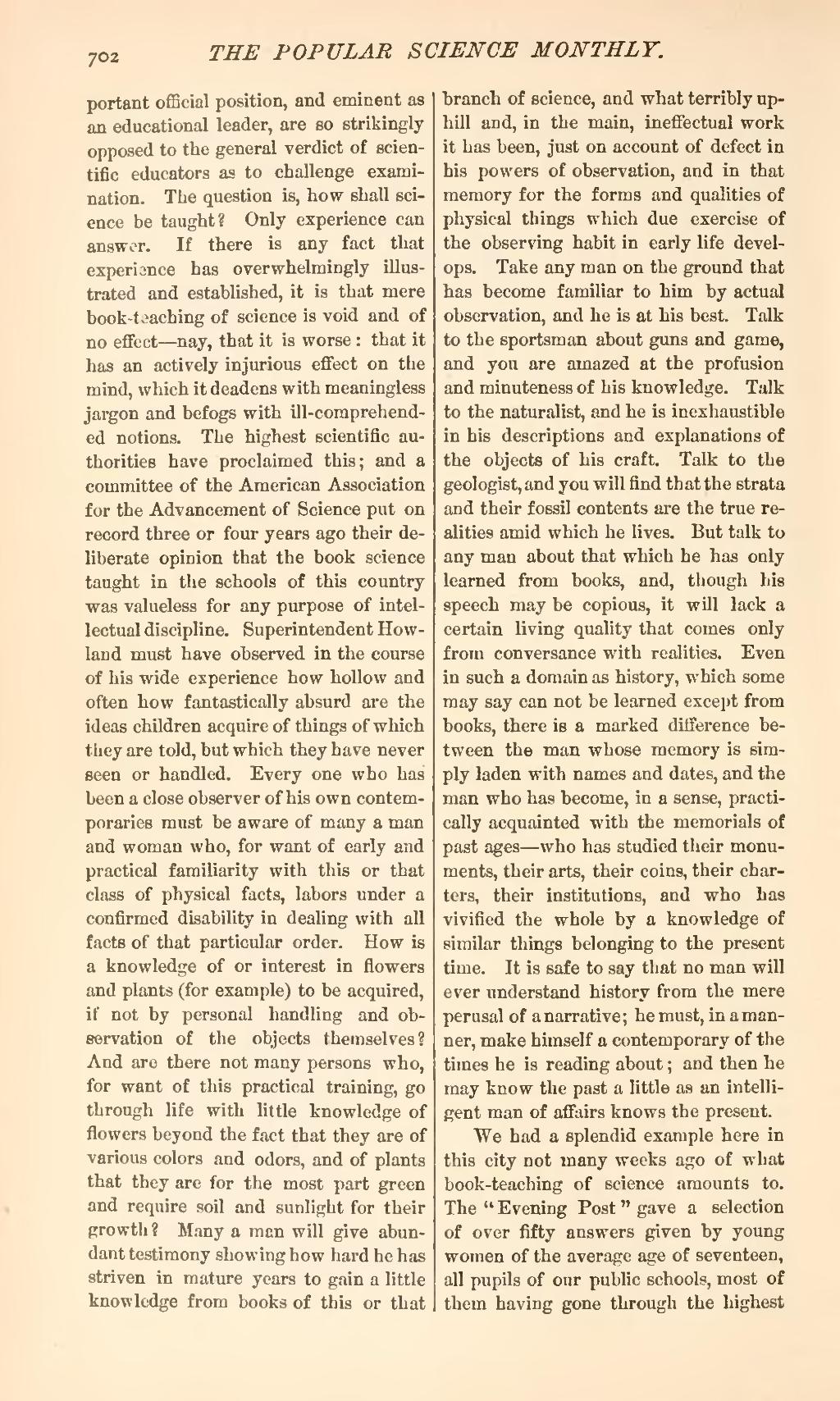portant official position, and eminent as an educational leader, are so strikingly opposed to the general verdict of scientific educators as to challenge examination. The question is, how shall science be taught? Only experience can answer. If there is any fact that experience has overwhelmingly illustrated and established, it is that mere book-teaching of science is void and of no effect—nay, that it is worse: that it has an actively injurious effect on the mind, which it deadens with meaningless jargon and befogs with ill-comprehended notions. The highest scientific authorities have proclaimed this; and a committee of the American Association for the Advancement of Science put on record three or four years ago their deliberate opinion that the book science taught in the schools of this country was valueless for any purpose of intellectual discipline. Superintendent Howland must have observed in the course of his wide experience how hollow and often how fantastically absurd are the ideas children acquire of things of which they are told, but which they have never seen or handled. Every one who has been a close observer of his own contemporaries must be aware of many a man and woman who, for want of early and practical familiarity with this or that class of physical facts, labors under a confirmed disability in dealing with all facts of that particular order. How is a knowledge of or interest in flowers and plants (for example) to be acquired, if not by personal handling and observation of the objects themselves? And are there not many persons who, for want of this practical training, go through life with little knowledge of flowers beyond the fact that they are of various colors and odors, and of plants that they are for the most part green and require soil and sunlight for their growth? Many a man will give abundant testimony showing how hard he has striven in mature years to gain a little knowledge from books of this or that branch of science, and what terribly uphill and, in the main, ineffectual work it has been, just on account of defect in his powers of observation, and in that memory for the forms and qualities of physical things which due exercise of the observing habit in early life develops. Take any man on the ground that has become familiar to him by actual observation, and he is at his best. Talk to the sportsman about guns and game, and you are amazed at the profusion and minuteness of his knowledge. Talk to the naturalist, and he is inexhaustible in his descriptions and explanations of the objects of his craft. Talk to the geologist, and you will find that the strata and their fossil contents are the true realities amid which he lives. But talk to any man about that which he has only learned from books, and, though his speech may be copious, it will lack a certain living quality that comes only from conversance with realities. Even in such a domain as history, which some may say can not be learned except from books, there is a marked difference between the man whose memory is simply laden with names and dates, and the man who has become, in a sense, practically acquainted with the memorials of past ages—who has studied their monuments, their arts, their coins, their charters, their institutions, and who has vivified the whole by a knowledge of similar things belonging to the present time. It is safe to say that no man will ever understand history from the mere perusal of a narrative; he must, in a manner, make himself a contemporary of the times he is reading about; and then he may know the past a little as an intelligent man of affairs knows the present.
We had a splendid example here in this city not many weeks ago of what book-teaching of science amounts to. The "Evening Post" gave a selection of over fifty answers given by young women of the average age of seventeen, all pupils of our public schools, most of them having gone through the highest

